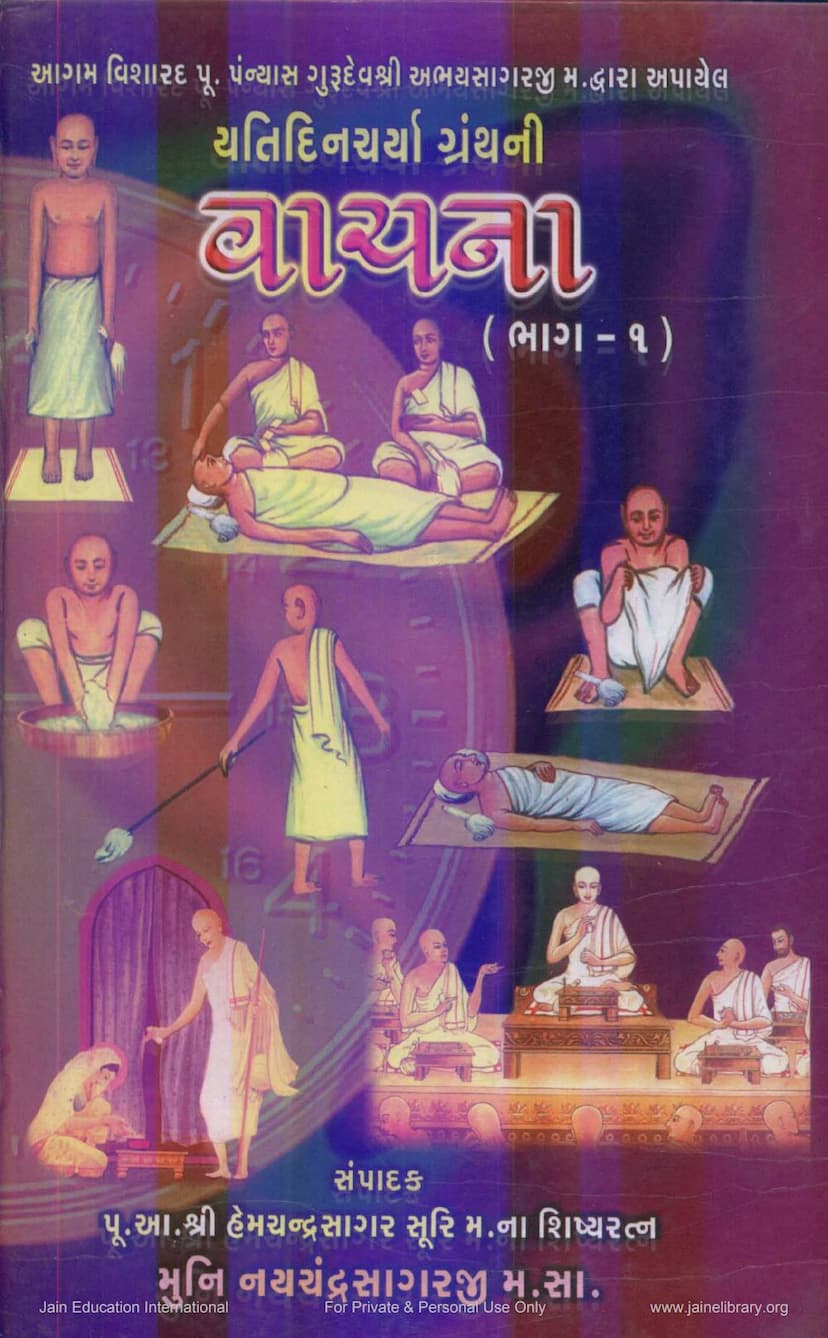Yatidincharya Vachna 1
Added to library: September 2, 2025

Summary
This is a comprehensive summary of the Jain text "Yatidincharya Vachna 1" by Abhaysagar, published by Agamoddharak Pratishthan, based on the provided pages.
Title: Yatidincharya Vachna 1 (Part 1) Author: Pujya Pannas Gurudev Shri Abhaysagarji M. Editor: Muni Nayachandrasagarji M. (disciple of Pujya Acharya Shri Hemchandrasagarsuri M.) Publisher: Shri Agamoddharak Pratishthan
Overall Summary:
This book, "Yatidincharya Vachna 1," is the first part of a series of discourses (Vachna) delivered by the revered scholar and ascetic, Pujya Pannas Gurudev Shri Abhaysagarji M. These discourses are based on the "Yati Dincharya" granth (text on the daily conduct of ascetics) compiled by Pujya Acharya Bhavdevsuriji M. The book aims to elucidate the principles and practices of a righteous ascetic life according to Jain scriptures, emphasizing the importance of adherence to discipline, ethical conduct, and spiritual discipline (Sanyam).
The discourses were delivered during the Chaturmas of Samvat 2040 in Palitana, specifically to monks and nuns. Pujya Gurudev Shri Abhaysagarji M. placed significant importance on these "Vachanas" (discourses) over mere lectures. The text is presented as a fruit of these extensive discourses, aiming to strengthen the monastic community (Shraman Sangh) in terms of scriptural knowledge and ethical practices. The compiler emphasizes the need to preserve the purity of these teachings, especially in the current era influenced by external cultures.
Key Aspects and Themes:
- The Core Text: The book is a commentary and elaboration on "Yati Dincharya," originally compiled by Acharya Bhavdevsuriji M. and further elaborated by Acharya Matisagarsuri M. The discourses by Pujya Abhaysagarji M. are faithful to the original text while incorporating a vast array of knowledge.
- Author's Expertise: Pujya Abhaysagarji M. is highlighted as an "Agam Visharad" (an expert in Jain Agams) and a devout practitioner of the Namokar Mahamantra. His knowledge is vast, drawing from numerous Agams, Prakaranik Granths, Jain and non-Jain texts, Vedas, modern science, astronomy, and geography. He possessed a unique skill in interpreting the etymological and contextual meanings of words, leading to profound insights.
- Compilation and Editorial Process: The daunting task of compiling and editing these discourses was undertaken by Muni Nayachandrasagarji M., under the guidance of Acharya Jinachandrasagarsuri M. The compilation involved extensive research, cross-referencing with various scriptures, and collaboration with several learned nuns, which contributed to the depth and accuracy of the text. The editor also highlights the challenges of capturing the rapid flow of the discourses, requiring meticulous research to resolve ambiguities and ensure authenticity.
- Emphasis on Sadhana and Conduct: The discourses delve deeply into the daily life and conduct of ascetics (Yatis and Sadhus/Sadhvis). This includes:
- The Meaning of "Dincharya": Understanding the daily routine as a means of achieving spiritual progress and eradicating the effects of Mohaniya Karma.
- Purity of Conduct (Samachari): The text stresses the importance of meticulous adherence to Samachari (disciplinary rules and practices) as the foundation of ascetic life, even when the mind might be distracted or facing challenges.
- The Role of Knowledge and Understanding: The discourses emphasize that knowledge (Gyan) must be coupled with right conduct (Achar) for true spiritual progress. The ultimate goal is the eradication of Mohaniya Karma.
- Ethical Principles: The text touches upon various ethical principles such as the importance of self-reflection, the detrimental effects of indulging the senses, the nuances of Abhigrah (vows/commitments), the meaning of true happiness found in hardship, and the responsibility of ascetics towards lay followers.
- Spiritual Practices: Discussions include the significance of various practices like meditation, understanding the meaning of verses, adherence to the disciplines of conduct, and the proper approach to austerities (Tapa) and alms-round (Gochari).
- Specific Conduct Rules: The discourses touch upon specific rules regarding meals, attire, the use of water, the importance of silence, the concept of "Avasahi" (a designated place for certain activities), and the detailed explanations of various rituals and their underlying principles.
- Theological and Philosophical Insights: The text integrates philosophical concepts, explaining the nature of Karma, the importance of the Guru-Shishya relationship, the essence of true devotion, and the path to liberation.
- Thematic Depth: The editor's notes and the introduction by Acharya Vijay Purnachandrasuriji M. highlight the profound insights within the Vachanas, covering topics like the necessity of scriptural study, the essence of monastic vows, the importance of purity in conduct, the subtle meanings of scriptural terms, and the practical application of Jain principles in daily life.
- Dedication and Purpose: The book is dedicated to the study, reflection, and practice of Jain monks and nuns, aiming to provide them with a clear path for spiritual growth and purity of conduct. The publisher, Agamoddharak Pratishthan, is committed to spreading authentic Jain literature.
- Detailed Content (Vachana-wise): The book is structured into 28 Vachanas, each covering specific aspects of monastic discipline and philosophy. These range from the definition of "Dincharya," the importance of "Samachari," the role of Yatis, the nature of "Papa" (sin), the practice of "Pratikraman," the significance of "Kausharga," "Swadhyay," and the proper observance of various rules and regulations. It also delves into the meanings of specific terms and practices within Jainism, offering scriptural references and elaborations.
In essence, "Yatidincharya Vachna 1" serves as an invaluable guide for ascetics, offering a detailed and insightful exposition of their prescribed conduct and spiritual path, rooted in the vast knowledge and profound understanding of Pujya Abhaysagarji M. The compilation and editing reflect a deep reverence for the teachings and a commitment to making them accessible and understandable for the spiritual benefit of the community.